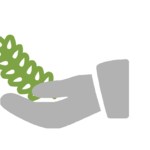Economy
Data on the economic characteristics of the population in the Municipality is significant for making sustainable interventions in the economy. Again, the economic characteristics serve as development indicators to assess the growth of the economy. Generally, the larger the employed population, the more wealth is created leading to the general well-being of the population. Contributing to employment opportunities in any area are factors such as the structure of the population, proportion of the economically active population and the labour market.
According to the 2010 Population and Housing Census the population of 15 years and above, being the economically active population, stood at 70.3 percent of the total area. Of these economically active 93.4 percent are employed. Of the unemployed part of the population nearly two thirds are first time job seekers.
Occupation
The leading sector in the Ejisu Juaben District is agriculture: 68.2% of the inhabitants are employed in this sector (Modern Ghana, 2014). Agriculture is also the sector that contributes the least to the average income, which means that the majority in the district is very poor. About 37% of the inhabitants working in the agricultural sector earn below 900 cedi (about 280 dollars and 220 euros) per year.


